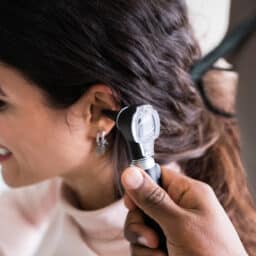Common Causes of Hearing Loss, and When to Seek Professional Help
Around 37.5 million American adults age 18 and older report having some hearing trouble; that’s about 15% of the American adult population. Hearing loss is a complex health condition, and there are several known causes of hearing loss or influences on hearing health. Things That Can Cause Hearing Loss The two most common causes of…
What Is Earwax, Anyway?
Did you know that earwax isn’t actually wax? It has a waxy, sticky texture, which is what gave it its name, but it’s composed of oil, proteins, and debris. The official name for earwax is “cerumen,” and your body produces it naturally. What Does Earwax Do? Earwax lines the walls of the ear canal, serving…
What Is Hearing Aid Occlusion?
Hearing aids bring a multitude of benefits to your life, reconnecting you to the world of sound and communication. However, sometimes hearing aids can make you feel like your ears are plugged up, which can be mildly uncomfortable. Noise around you can sound hollow or tinny, and the sound of your own voice, chewing and…
How to Protect Your Hearing This Hunting Season
Hunting season draws closer. Hunters rely heavily on a good sense of hearing to stay alert and track and identify their game. However, the firearms they carry can also damage their hearing. Let’s discuss hearing loss caused by firearms and review some tips on protecting your hearing this hunting season so that you can maintain…
How To Take Advantage of the Bluetooth® Features in Your Hearing Aids
In our digital age, technology is constantly improving, and hearing aids are no exception. Modern hearing aids are equipped with superior technology, and users are hearing better than ever before. Additionally, hearing aids have more features, notably Bluetooth. Bluetooth is a technology that connects electronic devices to each other wirelessly, and it has many uses…
Managing Tinnitus with Hearing Aids

Living with tinnitus—the persistent ringing, buzzing or hissing in your ears—can be overwhelming. What might feel like just an irritating background noise to some can disrupt daily life for others. Fortunately, hearing aids can be a game-changer. These devices offer relief by amplifying the sounds around you while reducing internal noise. How Hearing Aids Help…
Is There a Connection Between High Cholesterol and Hearing Loss

High cholesterol is linked to several health conditions and has potential to impact auditory health. Recent research suggests that elevated cholesterol levels may play a role in hearing decline, particularly as people age. Understanding this connection can encourage better preventative care for both cardiovascular and auditory health. Read along to learn more. How Cholesterol Affects…
How to Monitor Your Hearing Loss When You Live Alone
Living alone comes with both freedom and responsibility. When managing hearing loss, everyday tasks and social interactions can present unique challenges. Fortunately, with the right strategies and tools, it’s entirely possible to maintain independence and stay safe while living alone with hearing loss. Create a Safe and Accessible Living Environment Safety is a top concern…
What to Expect When Visiting a Hearing Specialist

Hearing plays a huge role in everyday life—whether chatting with friends, listening to music or simply hearing the leaves rustling in the trees at Columbia Park. One important step in protecting this vital sense is scheduling regular tests with a hearing specialist. Let’s take a look at what you can expect from a hearing testing…
Understanding Common Ear Problems and Their Impact on Hearing

Your ears—made up of outer, middle and inner sections—work tirelessly every day to help you hear your loved ones, music and the chirping birds at Delthorne Park. But when something goes wrong, those familiar sounds can quickly disappear. Let’s explore some common issues that can affect your hearing and how you can manage them. Ear…
